#blue eye samurai meta
Text
uhhh thinkin about how mizu and taigen's relationship was described as "this meeting of the minds, this meeting of the swords, that they could not share with anybody else" in one of the netflix articles about the show
and i'm going crazy because YEAH they're both equally invested about swords and fighting in a way that nobody else in their lives are. and that's just. so important considering we're talking about mizu, who sees her sword as her own soul.
and it's not JUST mizu who's obsessed with fighting. taigen is too. cuz like after their duel at the shindo dojo, as taigen is examining his bald spot in the mirror where mizu cut off his hair, he literally interrupts his own turmoil over losing his honour, just to express his awe, openly admiring mizu's skill DESPITE the fact that mizu just beat his ass and stripped his honour and status from him

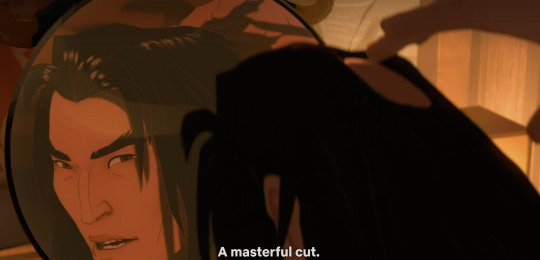
then in the next episode, mizu says a very similar line when she examines the cut flower that fowler had pinned to heiji shindo's robe.

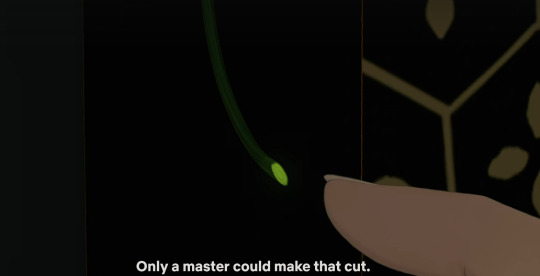
this was also such a sudden thing to notice in the middle of their conversation (my interpretation of this is that it hints to fowler's own skills with a blade, and gives mizu information about her enemy being a formidable opponent), but the fact that mizu had such a keen eye and managed to hone in on such a tiny detail from like a foot or two away is interesting because it shows us just how attentive mizu is, especially when it comes to blades and anything to do with them
to mizu (when she's not spiralling and agonising over her own self-hatred and the way the world treats her), swords are not a mere tool for revenge, but an art form which she is fascinated by and loves and admires. we see this from time to time, during rare moments of respite, like when she admires the duel in the beginning of ep4
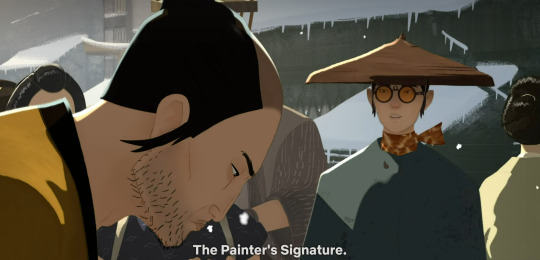
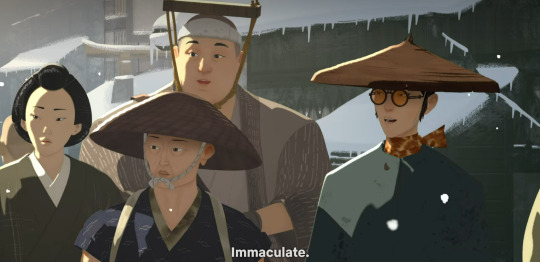
mizu also takes to heart all the teachings from her years training, while taigen is interestingly less strict about them, basically disregarding some of those teachings as mere pedantry, or even if he doesn't actually really think so, he at least tells mizu as much in his attempt to comfort her after her sword breaks

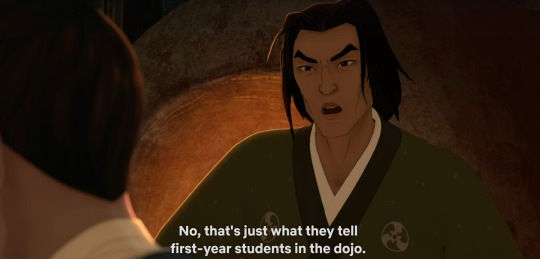
but that doesn't mean he doesn't care for the more formal aspects of his training at all. because in ep3 when he says this

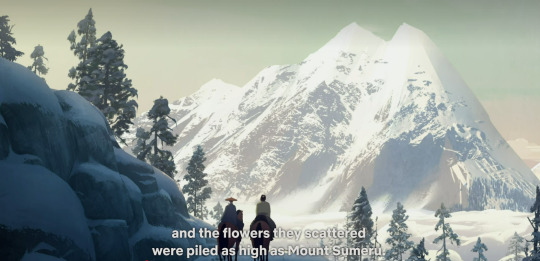
this line about mount sumeru is not talking about the literal mountain in front of them, but is a recitation of a line from the lotus sutra, which is among the mahayana sutras that they learned as part of their spiritual training, as zen buddhism forms a lot of the basis for samurai doctrines and philosophy. the sutra given more emphasis in the show is the heart sutra that mizu writes on her body in ep7 during her rite of rebirth
so taigen saying this line, as i see it, is a way to bond with mizu, or at least make conversation over their shared knowledge, as we see him await a reaction as soon as he says this. but mizu gives him none, and he looks disappointed/annoyed/frustrated or what have you as he watches her walk off without a word
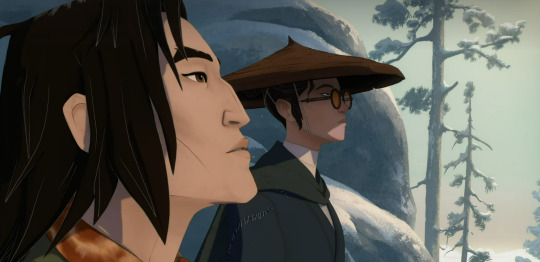
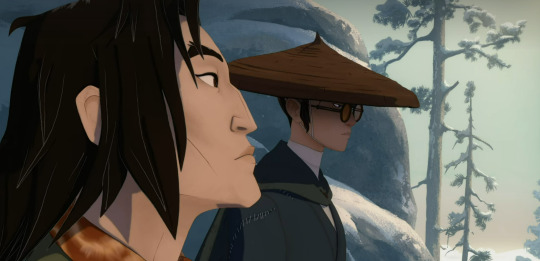

also we see a little more of their shared knowledge of swordsmanship in the last episode when it's clear that mizu has been training ringo in sword fighting techniques
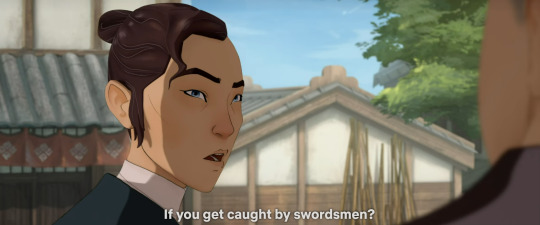
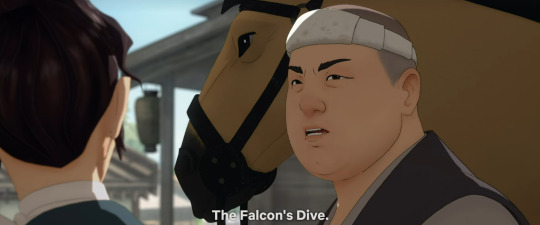
and later taigen recognises it instantly


they're both nerds about swords and fighting!!! they both respect each other's skills!!!


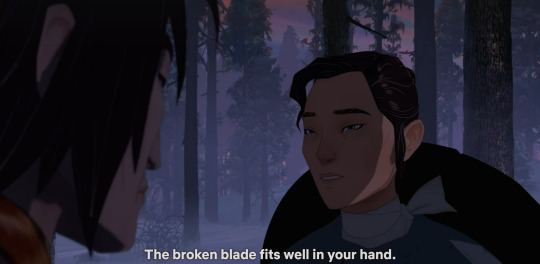
GOD i really hope in future episodes they get to bond some more over their shared passion and common training and just samurai camaraderie in general!!! mizu clearly loves the artistry of sword fighting so much, she deserves to have a confidant who shares that with her, someone she can talk openly about these things to!!!
because like remember when mikio was telling her about the naginata, she looked soooo uwu in love!!! admiring her husband as he showed off the weapon and told her the benefits of using it!!! believing at the time that she'd found a match who she could openly share her love of martial arts with!! she was having so much fun sparring him too. everyone says fighting is part of her love language and YES it IS!!!

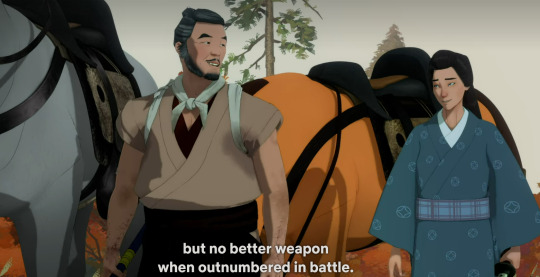
except the difference is that mikio—due to, among other things, their large age difference and subsequent gap in life experience—believes he is mizu's teacher, rather than her equal. this is the role he's readily taken throughout their marriage, from teaching her how to throw a knife to cut down fruit (not like she needed that particular lesson), to teaching her equestrian skills.
meanwhile taigen and mizu were both kids growing up poor in the same backwater fishing village, which means that they are and always have been PEERS. and this becomes even more pronounced once taigen is stripped of his giant ego and unlearns his prejudice, allowing them both to fully respect each other and view each other as equals

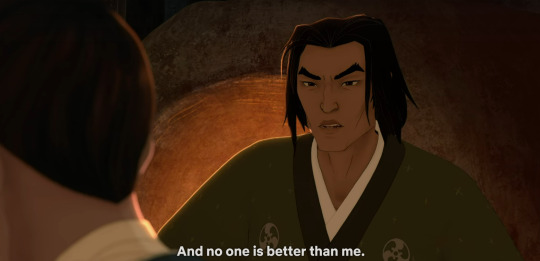
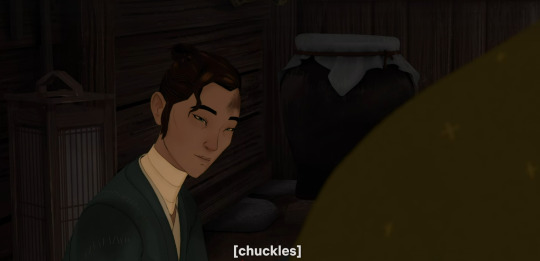
which is again why it frustrates taigen when mizu admits later in this scene that she basically doesn't care about saving the shogun. like he gets mad because it upends his initial belief in their shared goals and aligned values, believing them both to be samurai of equal standing and honour.
ALSO i'd like to add, that though mizu is the better swordsman as we see her win all their brawls and matches, she doesn't surpass him by that much, and mizu knows this.
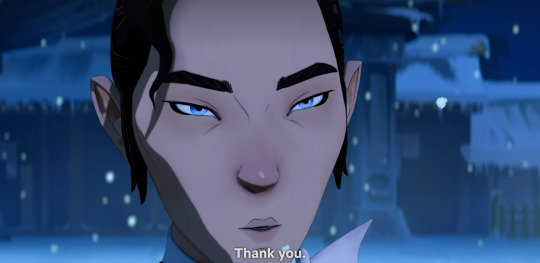
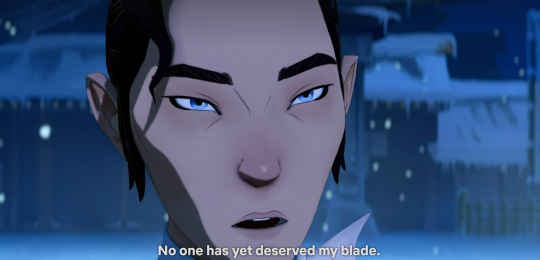
these words coming from mizu is such a huge compliment all things considered, acknowledging that he was strong enough to deserve fighting her, because shortly before this mizu was just about to say "no one has given me much of a challenge" only for taigen to enter the scene and, well, challenge her.
now combine this with her saying that chiaki's broken blade suits him well, giving to him HER sword which SHE made AND won, as a surety, promising him a duel that he "deserves". it's proof that even though she finds taigen an annoying brat and oftentimes an obstacle to her mission for revenge, she DOES respect him and does value his skills.
IN CONCLUSION nobody else is on their level, nobody else shares their love of swordsmanship and that is such an important factor to their bond and the way they relate to each other. i rest my case your honour
#mizu x taigen#taigen x mizu#taimizu#taizu#blue eye samurai#mizu blue eye samurai#taigen blue eye samurai#blue eye samurai meta#i caaaant stop thinking about THEM#like im soooo sorry im being annoying and cant shut up about these two#the brainrot is real yall. pray for me in these trying times#shut up haydar#meta dissertations.pdf#fandom.rtf
1K notes
·
View notes
Text
Something cool about Blue Eye Samurai is how sex is juxtaposed with the end-goals.
I really love how our three protagonists are all obsessed. And that obsession defines them, torments them, and are subsequently reborn through their obsessions.
Mizu, of course, is obsessed with the concept of revenge. It's not even about getting even or getting justice as some might use to justify the bloody road taken—it is simply about seeking satisfaction for Mizu. She cuts a bloody swathe across Japan because of what the Four White Devils did to her mother and herself. She does not concern herself with the ramifications of her wrath but merely charges forward, leaving behind a trail of viscera and gore behind her.
Like I said before, her vengeance and obsession with satisfaction is not painted by the show as wrong. It is how she allows it to affect others along the path. It's why the episode with Madame Kaji is so enlightening; Mizu should not tackle this quest as a vengeful revenant; an onryō. She has let the world define her as a monstrosity and so she embraced it, when Swordfather and Madame Kaji knew what the correct path was to satiate her need for vengeance. Treat her sword as the Artisan's tool it truly is. Treat her body the way an Artist would treat their canvas.
Madame Kaji and Swordfather are both outcasts, for being a woman and a blind man. Yet they found strength in their exclusion, becoming single-minded in their fields of art. Because sex is art and swordsmithing is art. It's what makes Mizu's body writing scene so fucking good.
Artistic vision becomes stagnant when one pulls from only one source. They become rigid and unbending when Mizu, like her namesake, must be fluid. She has shown fluidity in her use of her gender and her morals, but cannot apply that same flexibility towards her goal. Throughout season one, she was becoming an uninspired artist, merely painting the world in hues of scarlet. In a world that forces Women to be either Wives or Whores, Mizu chose to be a Warrior—but a warrior fights for a cause, whether it be just or otherwise. A soldier fights in an army. Mizu is neither of these things. She is an Artist first and foremost, and her medium is Death. Sex, something Mizu was at first hesitant before her failed marriage, and something she actively avoided afterwards, is what gives her a new perspective. Like an Illustrator studying life to better draw their intended worlds, taking inspiration from wherever one can find it.
Taigen and Akemi are also equally affected by the artistry of sex, as befitting of Mizu's fellow protagonists.
Akemi is quite obviously Mizu's narrative foil. Mizu chases after revenge like a bloodhound whereas Akemi longs for freedom like a bird in a cage. Both are fierce women who are unsatisfied with their lot in life, with their sex and gender being used against them in their lives. Literally, the episode "The Tale of the Ronin and the Bride" is a fucking triple entendre:
Mizu is the Ronin as well as the Bride.
The play showcases the tale of the Ronin and the Bride.
It is also Mizu as the Ronin and Akemi as the Bride.
And when Mizu finds her center as she melts down her blade and engages in body writing, this scene of enlightenment is juxtaposed with Akemi laying with her new husband Takayoshi. Both, in this moment, are taking control of their lives through sex. They are both taking control of their futures through the ways Madame Kaji taught them. Mizu and Akemi are both rebels against this oppressive society, and are both talented artists with their body. Whether that be sex, politicking, or ass-kicking.
Taigen, like the two women before, finds freedom through it but in a more subtle manner.
Where Mizu and Akemi are narrative foils, both using sex as a form of art and escape, Taigen finds liberation through his awakening.
Like the closeted bisexual man he is, he begins his journey of self-realization when he first encounters Mizu at the Dojo.
Every single battle these two have is purposefully rife with sexual tension. All his life, Taigen has been taught that a man must live with honor. That he must take control of his life and his identity, or he will have failed and that he is better off dead than to live with such shame.
Taigen is just as much a victim of the Patriarchal society around him. Mizu rails against it violently. Akemi seeks to run away from it all. And Taigen, with the privilege given to him by his manhood, chooses to become a perpetrator, enabling the vicious wheel of society to keep moving forward.
His obsession with honor leads him to hunting down and even protecting Mizu. Mizu is no doubt the better warrior, but even she knows she owes so much to Taigen. The blockhead not only did everything to protect her in the valley, but also sealed his lips shut even under the duress of torture. His obsession with honor becomes an obsession with Mizu.
His regrets over tormenting her over her looks and ethnicity as a child. His shame in having lost so decisively in his own dojo. Taigen was a man born with nothing and climbed up to the top with every advantage he could muster, and suddenly it's all ripped away by this one vengeful spirit passing by.
Taigen learns to surrender control around Mizu. He begins to discover his own sexuality and purpose around Mizu, redefining what honor really means to him now that he, as a man, has a budding attraction towards the man who beat him.
Mizu's Vengeance. Akemi's Freedom. Taigen's Honor. In all three, Sex becomes a catalyst in redefining what each of these concepts truly mean to them all. It's not just sex of course, but it is undeniable how the writers keep juxtaposing sexual acts and thoughts with massive character moments.
It changes how Mizu chases after her Vengeance. It recontextualizes how Akemi can be Free. It showcases the absurdity of the Honor forced upon Taigen.
It's so fucking refreshing seeing Sex not used as fanservice or shoe-horned in just to further a stale, poorly written cis-heterosexual romance; but used as a plot point that cannot be ignored. An impetus that fuels the narrative.
Moving forward, I'm curious as to how sex will be used.
The next few ideas aren't as sound or organized because I'm neither Asexual nor Genderfluid, so please if anyone reads this who understands it better, feel free to point it out.
I think it'd be cool if Mizu met the inverse of Madame Kaji. A person who is apathetic to sex. Sure, Swordfather has shades of this, but I'm tired of the person with disabilities also being on the Asexual spectrum. And I'm not saying that Ace or Graysexual people with disabilities don't exist! But they always tend to be written as having some form of disability (Varys from ASOIAF) or a Robot.
Just as artists need a variety of sources to pull inspiration from, I hope in the next seasons we get to see different perspectives on sex and gender. In London, it feels like Mizu finding the other half of herself, and with that having a better way of tackling her own identity. Whether it be gender, sex, combat, etc.
Basically what this inane rambling amounts to is that Blue Eye Samurai tackles sex and violence and revenge and obsession in ways that most media has yet to truly do. So that was pretty cool.
#blue eye samurai#blue eye samurai spoilers#blue eye samurai season 2#mizu#mizu blue eye samurai#akemi#taigen#metal#media analysis#character analysis#blue eye samurai meta#netflix are cowards for not announcing season 2 immediately#come on dickheads#the fans and the creators have been fighting for the green light#hand it over#you cocks#paprikash ramblings
561 notes
·
View notes
Text
“We need more reception arcs like Zuko’s!”
Baby girl, you couldn’t even handle Taigen.
A huge reason why Zuko has been immortalized so fervently is because ATLA came out in the mid 2000s, nearing two decades ago. With the state of basic reading comprehension, much less media literacy, social awareness, and chronically online behaviour that exists nowadays in a way it did not exist fifteen years ago, I would be surprised if the live action ATLA tv adaptation didn’t make Zuko a bit more likeable right off the bat. I’m not saying I agree with it, but if the show-runners are concerned about audiences reactions to Sokka’s (wrong, but relatively mild) sexism that exists in only the first few episodes of the show, then the idea of redeeming Zuko has got to be terrifying them. Tbh I don’t entirely blame them, even though I’m not certain it’s a good idea for the story as an adaptation.
#not to mention that bes is adult and atla is for child audiences… oof#blue eye samurai#avatar the last airbender#atla netflix#atla live action#avatar: the last airbender#bes netflix#netflix#netflix adaptation#taigen blue eye samurai#taigen bes#Zuko#prince zuko#zuko atla#sokka#atla sokka#atla discourse#blue eye samurai meta#atla meta#atla headcanons#taimizu#zutara
250 notes
·
View notes
Text



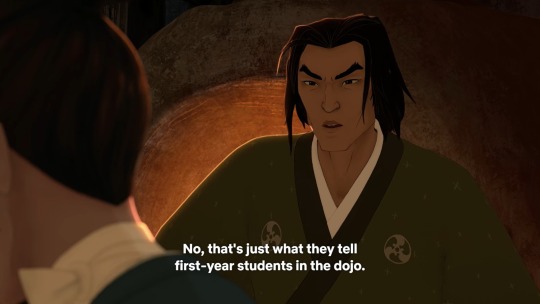
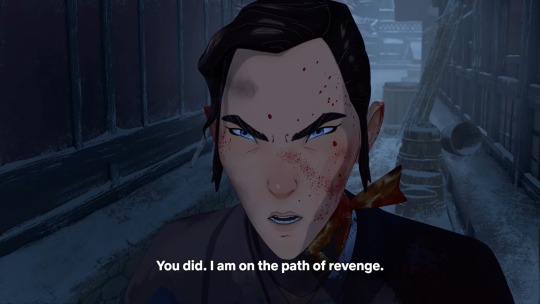
Episode 5: The Ronin and the Bride // Episode 7: Nothing Broken
Mizu pretends to not care for the title of "Samurai", but she does. She does want to be honorable, she does want meaning. But she can't have that. Not until she gets her revenge. And yet, she let Taigen see that side of herself. Maybe not even consciously, but now he knows.


He knows she does care.

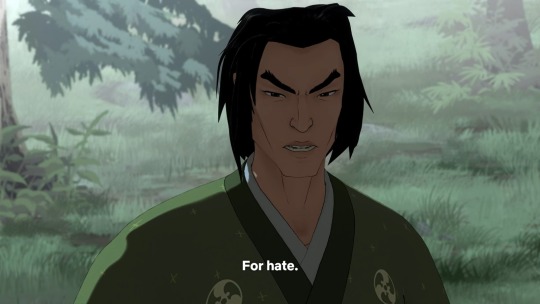
And then turns on her. Even though he previously validated her. And Mizu, she knows he's right. She isn't a samurai, she can't be. She's just looking for a man to kill.
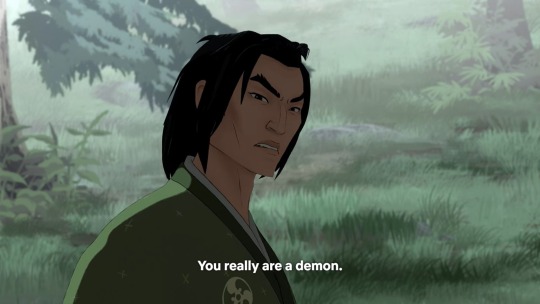
She's just a demon. Thus, the anger fades away, and is replaced with shame.
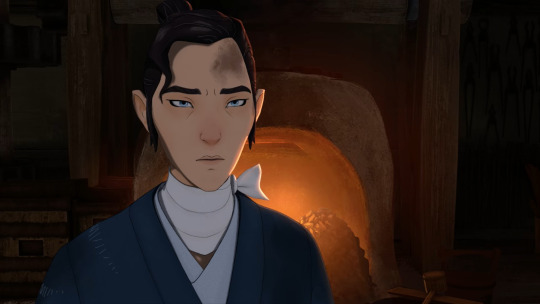
And so he leaves. Only to be seen again at death. And she knows she will never have his kindness again. An honorable, pure-blooded man's kindness. A samurai's kindness. Because she never deserved it.
#mizu#mizu meta#mizu blue eye samurai#taigen#ringo#taigen x mizu#mizu x taigen#taizu#taimizu#bes meta#blue eye samurai meta#blue eye samurai#bes talk
65 notes
·
View notes
Text
What Are Little Girls Made Of?
“That child would see you and run.”
Master Eiji has several amazing lines as the local Wisdom Dispenser of Blue Eye Samurai, but I think this is the deepest of all.
It doesn’t sound like a dissuasion from Mizu’s quest, but it is.
It’s confirmation that she’s a soulless beast, but it’s a warning instead of an insult.
In the Ronin and the Bride play that parallel’s Mizu’s singular attempt at being happy, in the very moment where Mizu decides to throw away her relationship with Mikkio and her patience for Mama, the ronin puppet murders his child. In the immediate context of episode 5, it’s a literal demonstration of Mizu killing her chance at peace and a future.
Now flash forward to episode 7, on the eve of her quest fulfillment. In pointing out her hollowness, Master Eiji is implying that Mizu once had a soul. Once had an option to turn back. Once had gentleness. Once had patience. Once had teachability in her. Once had innocence.
If her rebirth and reforging of that sword mattered afterwards, why did the conversation still shift towards the content of Mizu’s heart and not her head?
Eiji is making a suggestion that should shatter the viewer—even if Mizu seemingly blew past it completely.
Is Mizu becoming a villain?
On paper, the answer is no. Blue Eye Samurai is commendably great at keeping Mizu amoral for her own benefit, but not unkind.
Narratively, still no, but the feeling that Mizu isn’t a good person should linger.
Fowler spelled it out in the final boss, but that doesn’t count in my eyes. He was taunting her in-story, and making a point about whiteness being genetically destructive out-of-universe.
[By the way, I think BES was doing a great job talking about colonialism until episode 8 which was a little too heavy handed with Fowler’s rancid takes right at his actual brawl with Mizu, but that does not enter into this post.]
If it was just Fowler’s cheekily evil means to an end, to get under Mizu’s skin and into London so he would have the cultural upper hand, Mizu being on a dark path would already be stale as it was uttered in the writers’ room.
Mizu doesn’t want to be associated with innocence, but Eiji insisting that maybe she should be, that maybe she is wrong to abandon happiness, needs to be a red flag to the viewer.
Mizu’s no hero. She’s no samurai. But she is her own unreliable narrator. If who she once was would be afraid of her now, then maybe we would do well to judge Mizu’s actions in England by the same lens as Swordfather judges: with the intent to dissuade her from whatever it is she sees.
#blue eye samurai meta#netflix blue eye samurai#blue eye samurai#I know this is probably shakily worded#but in my defense I only watched the show once and can’t rewatch in the presence of my family members#I have such a penchant for non-hero protags#mizu blue eye samurai
79 notes
·
View notes
Text
So this may be reaching but is Fowler's nine levelled castle modelled on Dante's Inferno?
It's a place where the white man's religion has a home (the chapel) in contrast with the rest of Japan. It's also be an interesting contrast with the previous episode with it's intricate structure that encompasses Mizu's present and past framed around the traditional tale of a vengeful samurai.
The tunnels that Mizu enters to access the castle contain the skeletons of Fowler's mixed race children. These children are unburied and unbaptised and therefore in the religion of their father's people, stuck in Limbo (the first circle of Hell).
(There's people much better placed than me who can assign the other levels of the castle, like what the fuck are those monkeys supposed to represent - the harpies in the fifth circle of Hell?)
When Mizu finally gets to the ninth level of the castle, Fowler is there with Shindo and 2 government officials. The ninth circle of hell is reserved for traitors and these 3 men fit the bill, betraying their country and their Shogun for wealth and status (their equivalents, Brutus, Cassius and Judas are chewed on and mauled by the Devil). And then there is Fowler at the very centre, who Mizu has previously stated to Shindo is "the Devil you made a bed with".
70 notes
·
View notes
Text
I can't stop thinking about the prisoners in Fowler's castle. Our main character was tripping out during this scene, and I genuinely believe that they were human, but what the FUCK have they gone through? My assumption is that they had been starved enough to consider Mizu to be food, but I'm not sure Fowler would do that, given his past trauma, and even then, what's to stop them from tearing each other apart long before then?
I doubt we'll get any answers, but it's a fun and messed up thing to think about.
49 notes
·
View notes
Text
Every time I remember Mizu walking away from the farm after she killed her husband I think about how she would have walked back into the farm, passed her husband and mother's bodies to collect her possessions, including her sword, glasses, haori and hakama.
Did she leave the bodies there to rot or did she bury them?
184 notes
·
View notes
Text

Going back to my roots: posting bad-quality scans of traditional sketches. Because why not? ¯\_(ツ)_/¯
Anyway these two have totally taken over my brain so here have this <3
#blue eye samurai#mizu x taigen#taigen x mizu#taimizu#there was an attempt#oh yall thought i'll only flood the taimizu tag with my insane metas and delulu fic ideas? unfortunately im here to flood it with art too#sorry the brainrot is soooo real#until the taimizu fandom gets bigger i am prepared to cook all the food for this ship as i can#also sowwy this is low quality. maybe if i get time and energy i'll draw something proper for them
265 notes
·
View notes
Text
are people aware of the fact that Mizu is not canonically in any way shape or form.............. queer....bi.....
(quick note here because reading comprehension stays dead and people may not read the tag novel: I want bi Mizu! I hc her as bi! I love sapphic Mizu)
#Yall are not ready for this take but.......boy.......#can we like praise the show for all its wonderfulness without Proclaiming it a REVOLUTION for the LGBT com. before it actually earns it#It's a thought.......#No one wants bi Mizu more than me trust me but it's just not canon yet. Gender exploration has not gone There#we can meta and we can HC and we can analyse. But it's SUBTEXT#But actually full on praising it for .... something that it's just not there yet is wild to me#A sapphic AF woman#I GET IT. All I write is bi Mizu &Mizu/ladies but it's not canon yet! And if we get it great if we don't oh well!#I'm just saying that...you can't praise a show for what Might happen. That's all 🧘🏻♀️💙#Blue eye samurai is wonderful for so MANY other reasons#Stop giving it credit it has not earned#this is totally open to discussion and non confrontational btw❣️#if anything the only thing you can kinda give them rep for is Taigen getting a hard on for someone he thinks is a man and STILL...#blue eye samurai#bes mizu#and before anyone comes at me swinging I don't ship ta*zu. that's not at all my point.
41 notes
·
View notes
Text
Very interesting to me that a certain subset of the BES fandom's favourite iterations of Mizu and Akemi are seemingly rooted in the facades they have projected towards the world, and are not accurate representations of their true selves.
And I see this is especially the case with Mizu, where fanon likes to paint her as this dominant, hyper-masculine, smirking Cool GuyTM who's going to give you her strap. And this idea of Mizu is often based on the image of her wearing her glasses, and optionally, with her cloak and big, wide-brimmed kasa.
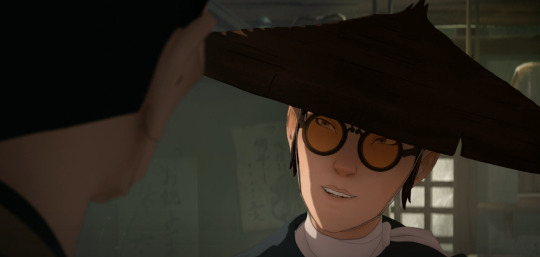

And what's interesting about this, to me, is that fanon is seemingly falling for her deliberate disguise. Because the glasses (with the optional combination of cloak and hat) represent Mizu's suppression of her true self. She is playing a role.

Take this scene of Mizu in the brothel in Episode 4 for example. Here, not only is Mizu wearing her glasses to symbolise the mask she is wearing, but she is purposely acting like some suave and cocky gentleman, intimidating, calm, in control. Her voice is even deeper than usual, like what we hear in her first scene while facing off with Hachiman the Flesh-Trader in Episode 1.
This act that Mizu puts on is an embodiment of masculine showboating, which is highly effective against weak and insecure men like Hachi, but also against women like those who tried to seduce her at the Shindo House.
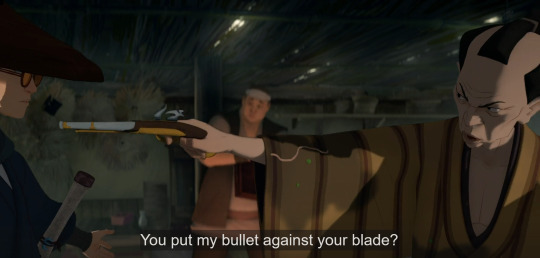

And that brings me to how Mizu's mask is actually a direct parallel to Akemi's mask in this very same scene.
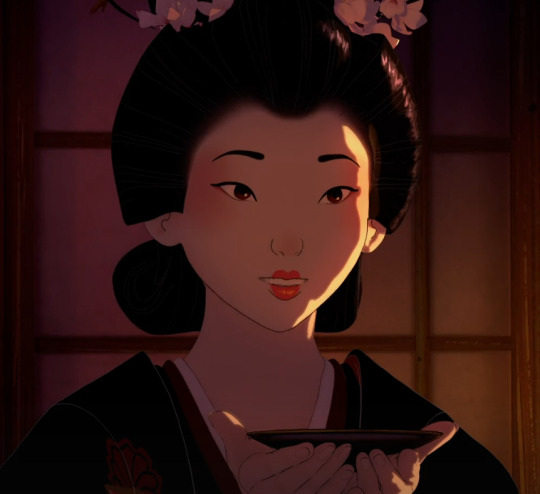
Here, Akemi is also putting up an act, playing up her naivety and demure girlishness, using her high-pitched lilted voice, complimenting Mizu and trying to make small talk, all so she can seduce and lure Mizu in to drink the drugged cup of sake.
So what I find so interesting and funny about this scene, characters within it, and the subsequent fandom interpretations of both, is that everyone seems to literally be falling for the mask that Mizu and Akemi are putting up to conceal their identities, guard themselves from the world, and get what they want.
It's also a little frustrating because the fanon seems to twist what actually makes Mizu and Akemi's dynamic so interesting by flattening it completely. Because both here and throughout the story, Mizu and Akemi's entire relationship and treatment of each other is solely built off of masks, assumptions, and misconceptions.
Akemi believes Mizu is a selfish, cocky male samurai who destroyed her ex-fiance's career and life, and who abandoned her to let her get dragged away by her father's guards and forcibly married off to a man she didn't know. on the other hand, Mizu believes Akemi is bratty, naive princess who constantly needs saving and who can't make her own decisions.
These misconceptions are even evident in the framing of their first impressions of each other, both of which unfold in these slow-motion POV shots.
Mizu's first impression of Akemi is that of a beautiful, untouchable princess in a cage. Swirling string music in the background.
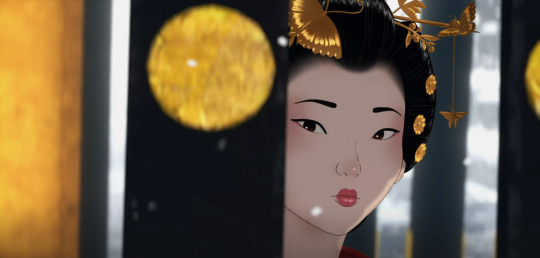
Akemi's first impression of Mizu is of a mysterious, stoic "demon" samurai who stole her fiance's scarf. Tense music and the sound of ocean waves in the background.

And then, going back to that scene of them together in Episode 4, both Mizu and Akemi continue to fool each other and hold these assumptions of each other, and they both feed into it, as both are purposely acting within the suppressive roles society binds them to in order to achieve their goals within the means they are allowed (Akemi playing the part of a subservient woman; Mizu playing the part of a dominant man).
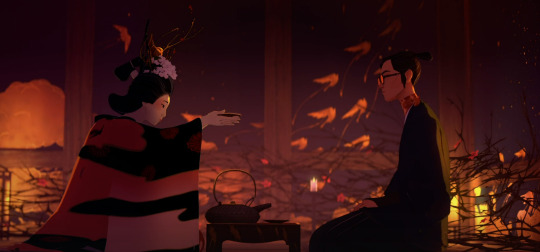
But then, for once in both their lives, neither of their usual tactics work.
Akemi is trying to use flattery and seduction on Mizu, but Mizu sees right through it, knowing that Akemi is just trying to manipulate and harm her. Rather than give in to Akemi's tactics, Mizu plays with Akemi's emotions by alluding to Taigen's death, before pinning her down, and then when she starts crying, Mizu just rolls her eyes and tells her to shut up.
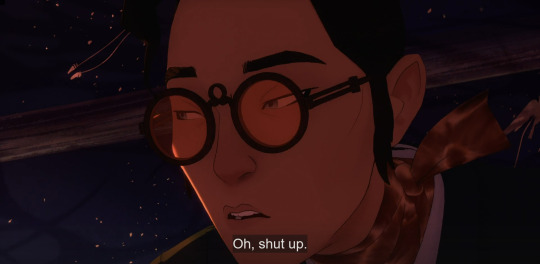
On the opposite end, when Mizu tries to use brute force and intimidation, Akemi also sees right through it, not falling for it, and instead says this:
"Under your mask, you're not the killer you pretend to be."
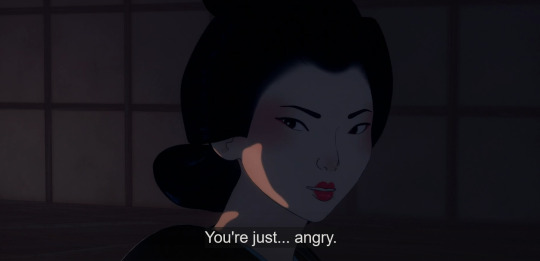
Nonetheless, despite the fact that they see a little bit through each other's masks, they both still hold their presumptions of each other until the very end of the season, with Akemi seeing Mizu as an obnoxious samurai swooping in to save the day, and Mizu seeing Akemi as a damsel in distress.
And what I find a bit irksome is that the fandom also resorts to flattening them to these tropes as well.
Because Mizu is not some cool, smooth-talking samurai with a big dick sword as Akemi (and the fandom) might believe. All of that is the facade she puts up and nothing more. In reality, Mizu is an angry, confused and lonely child, and a masterful artist, who is struggling against her own self-hatred. Master Eiji, her father figure who knows her best, knows this.
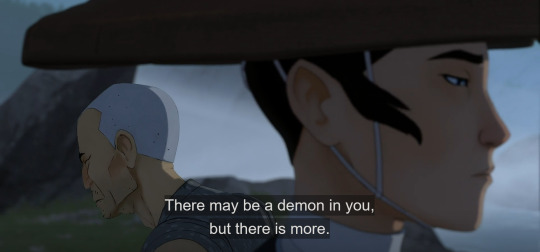
And Akemi, on the other hand, is not some girly, sweet, vain and spoiled princess as Mizu might believe. Instead she has never cared for frivolous things like fashion, love or looks, instead favouring poetry and strategy games instead, and has always only cared about her own independence. Seki, her father figure who knows her best, knows this.
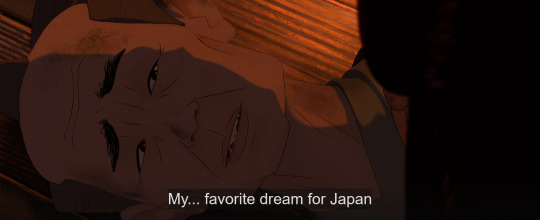

But neither is she some authoritative dominatrix, though this is part of her new persona that she is trying to project to get what she wants. Because while Akemi is willful, outspoken, intelligent and authoritative, she can still be naive! She is still often unsure and needs to have her hand held through things, as she is still learning and growing into her full potential. Her new parental/guardian figure, Madame Kaji, knows this as well.
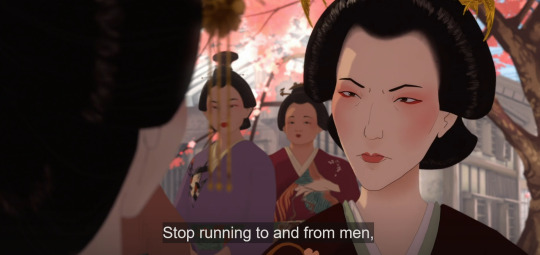
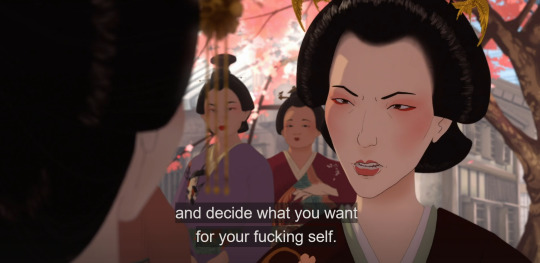
So with all that being said, now that we know that Mizu and Akemi are essentially wearing masks and putting up fronts throughout the show, what would a representation of Mizu's and Akemi's true selves actually look like? Easy. It's in their hair.
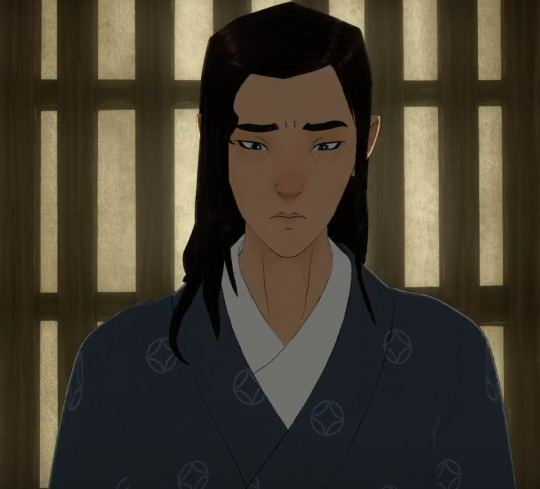

This shot on the left is the only time we see Mizu with her hair completely down. In this scene, she's being berated by Mama, and her guard is completely down, she has no weapon, and is no longer wearing any mask, as this is after she showed Mikio "all of herself" and tried to take off the mask of a subservient housewife. Thus, here, she is sad, vulnerable, and feeling small (emphasised further by the framing of the scene). This is a perfect encapsulation of what Mizu is on the inside, underneath all the layers of revenge-obsession and the walls she's put around herself.
In contrast, the only time we Akemi with her hair fully down, she is completely alone in the bath, and this scene takes place after being scorned by her father and left weeping at his feet. But despite all that, Akemi is headstrong, determined, taking the reigns of her life as she makes the choice to run away, but even that choice is reflective of her youthful naivety. She even gets scolded by Seki shortly after this in the next scene, because though she wants to be independent, she still hasn't completely learned to be. Not yet. Regardless, her decisiveness and moment of self-empowerment is emphasised by the framing of the scene, where her face takes up the majority of the shot, and she stares seriously into the middle distance.
To conclude, I wish popular fanon would stop mischaracterising these two, and flattening them into tropes and stereotypes (ie. masculine badass swordsman Mizu and feminine alluring queen but also girly swooning damsel Akemi), all of which just seems... reductive. It also irks me when Akemi is merely upheld as a love interest and romantic device for Mizu and nothing more, when she is literally Mizu's narrative foil (takes far more narrative precedence over romantic interest) and the deuteragonist of this show. She is her own person. That is literally the theme of her entire character and arc.
#blue eye samurai#mizu blue eye samurai#akemi blue eye samurai#blue eye samurai meta#just in case... im gonna tag this as#mizukemicritical#akemizucritical#though this post isnt actually criticising the ship itself but rather fanon's portrayal of the ship and the characters#for that reason lemme also tag this as#wank.mp3#feel free to disagree of course but please be civil#and if you need to rant about how wrong i am without any convincing evidence kindly feel free to make your own post. peace and love <3#fandom.rtf#meta dissertations.pdf#shut up haydar#edit: for full disclosure. i do rather dislike this ship. but obviously it's fine for anyone to enjoy it. please do! have your fun!#it's just that as usual! popular fanon and fandom around a ship is what has completely deterred me from any sense of enjoyment of it#it's a shame too because i was very open and even eager for some mizu/akemi romance in the future#but out-of-character fanon + the rudeness of certain fans has definitely soured it for me#but that doesn't mean people can't enjoy it obviously! ship and let ship!!!#plus it has its appeal which i DO STILL see and enjoy!!!!#i would even go as far as to call them soulmates because their narratives and characters are LITERALLY intertwined!!!#but. yeah. my gradual distaste for this ship is indeed very unfortunate.
664 notes
·
View notes
Text
Similar Stories, Different Treatments: Anakin Skywalker and Abijah Fowler
Ok, so recently I've been re-watching 'Blue Eye Samauri' on Netflix and last night it dawned on me that, generally speaking, Abijah Fowler and Anakin Skywalker have very similar stories and actions...and yet their respective fandoms react to the two of them very differently.
So, here's my long ass post analyzing the two of them and why people react to them so differently.
----------
First, comparing the two characters...
So, assuming that y'all know me for my Star Wars content, you probably know Anakin's story but, for the sake of this post, I'll explain it briefly.
Anakin was born into slavery and lived as a slave for 9 years. Then one day he and his mother met two Jedi and a handmaiden, and his mother asked the Jedi to take Anakin and train him---which they agreed to do, so Anakin had to leave his mother. At 19 he had nightmares about and then witnessed his mother's death when he went back to Tatooine before being promptly drafted into war along with the rest of the Jedi by the Senate.
After a harrowing 3 years of war and having his worst behaviors enabled/encouraged by the villain and his wife, Anakin begins to have nightmares about his pregnant wife dying. He then tries to prevent her dying, even though she's in perfect health.
We know a little less about Abijah Fowler's past, but we do know an integral part of it from this monologue:
"My country's history is one of manufactured suffering. I was a boy when the Tudors burned any food the rebels under O'Neill might think to eat. We starved. Everyone starved. Mouths on the dead stained green from chewing nettles---you get resourceful in a famine. My parents died early, left me and my sister catching rats. The rats ran out quick. Fed my sister on my blood, it kept her alive an extra two weeks. I didn't sleep for three days to protect her body from the starving 'til the ground thawed. I cut out her kidneys and buried her, fat cap on them like a pea.
I haven't eaten a single meal since my mind didn't go to that bite. It was the last thing I ever did because I had to. I control my life now, every bite."
-----
From my point of view, Anakin and Abijah are very similar in their motivations.
Both of them started out as, assumedly, sweet and kind and caring young boys. You don't harm yourself to feed your sister and then cause more harm to yourself to protect her after she's already dead, if you're not. Similarly, you don't bring three complete strangers into your home because you're worried about them and then risk your life to help them, if you're not.
Both of them then went through great tragedies and likely felt completely powerless because of these tragedies and the circumstances they found themselves in.
For Abijah it was growing up during a famine, witnessing the horrors of famine and what people had to do during it, witnessing the deaths of his parents, being unable to stop the death of his sister, and being forced into cannibalism---of his sister and likely parents, no less---to prevent himself from starving. For Anakin it was growing up as a slave, having to leave his mother at a young age, witnessing his mother's death, and then being thrust into a war and witnessing the horrors of that.
Because of that powerlessness, both Anakin and Abijah hate the idea of them being powerless and their actions are made from a mix of anger at whoever they blame for what has happened---whether they're actually to blame, or whether they've done nothing---and refusal to ever be powerless again, or at least accept that they're powerless.
These motivations led them both to commit- (Anakin) -or attempt to commit- (Abijah) -mass murder, *genocide, **cultural genocide, and murder of their female main character counterpart.
*Abijah wasn't necessarily setting out to commit physical genocide, but he was willing to do so if the people of Japan weren't willing to go along with his plans.
**I do consider Abijah's plans as including cultural genocide, since he has a whole monologue about the people of Japan being "godless" and how he'd force them into Christianity- (Catholicism?) -if he succeeded in killing the Shogunate.
----------
Now, comparing fandom's reaction to the two...
For Anakin, he succeeds in causing Padme's death, destroying the Republic aka the only democracy in the galaxy, committing cultural and physical genocide against the Jedi, murdering an entire village of Tuskens including the children, and going on to oppress and enslave the rest of the galaxy for decades...
...in contrast, Abijah only succeeds in committing mass murder and fails in all of his other plans---and his success in committing mass murder is partially due to the Shogun's sons and wife locking people inside the burning palace.
But, despite all of this, if you look into how their respective fandoms treat them, you'd assume that it was the opposite.
Anakin is lifted up as this good person who had no agency in any of his actions or, if he did, then the people he murdered "deserved it"---he's loved by most of the fandom and everywhere you look you see think pieces about how Anakin was really a victim, how his actions were justified, how he's not to blame for anything.
Meanwhile Abijah is hated and his actions are labeled by the fandom as bad. He's a terrible person and he's seen as such. I've never seen a single post justifying his actions or trying to say he isn't to blame for his actions.
Now, this is not me saying that the Blue Eye Samauri fandom is wrong to view Abijah this way---on the contrary, I agree that his actions are heinous and he's a terrible person, there's nothing there that I don't agree with.
However, I do think it's interesting how differently both characters are treated when one of them is, unequivocally, worse than the other.
----------
Why is this?
Now, I'm going to preface this section with the disclaimer that part of it is because Anakin is the main character of his media and Abijah is not---however, I believe that this has a very small effect on how fandom treats them since, as we've seen with other characters, screentime doesn't really matter that much when it comes to whether fandom likes a character or not.
Moving on-
-----
I think a lot of it is just that Anakin is conventionally attractive and Abijah isn't.
Anakin and Abijah are both selfish, misogynistic, racist, have violent responses to most things, and have committed atrocities in the name of personal gain. The only difference between them---besides the obvious differences that come with the medias they're in---is that Anakin is pretty to look at and Abijah isn't.
It'd be even worse if Abijah was a POC or a woman, even if he was conventionally attractive---as proven by other Star Wars characters.
Mace Windu? Fandom hates him and makes him out to be a villain.
Saw Gerrera? Same thing.
Rey Skywalker? People hate her and say she's "unrealistic" or "too OP."
Reva Sevander? People fucking CRUCIFIED her!
None of these people even come near Anakin's level of "I'm a terrible person and I do heinous things because why not!" Mace and Rey never did anything wrong, and Saw and Reva did the things they did because of trauma/revenge and/or working to take down a greater evil---and even then, neither of them do anything near as bad as Anakin!
Yet they're hated and held to a higher standard and crucified in a way that Anakin isn't.
-----
Another reason is that people can project onto Anakin in a way they can't project onto Abijah.
With Anakin, they can twist the Jedi's actions to fit whatever trauma they personally relate to, they can shove characters like Obi-Wan, Ahsoka, Mace, Yoda, etc. into whatever archetype they want to fit their story, they can excuse away every atrocity Anakin commits because he's doing it out of attachment and they think attachment means love, etc.
Meanwhile it's hard for people to project onto Abijah because everything and everyone around him is harder to change to fit his narrative.
There's no one really around him that you can say manipulated, abused, or otherwise forced him into doing the things he did. The other characters don't really interact with him, so people can't say the characters "deserved" what he did to them. And he openly admits that he's doing things out of greed, whereas Anakin says he's doing things out of love when he's really not.
----------
In conclusion, Abijah Fowler and Anakin Skywalker are both people that experienced tragedy and became terrible people that did heinous things because of it---but people only justify one of their actions because they think he's pretty and project onto him.
They're the same person in different medias 🤷♀️
#fandom meta#star wars#sw prequels#blue eye samurai#anakin skywalker critical#anti anakin apologists#abijah fowler
60 notes
·
View notes
Text

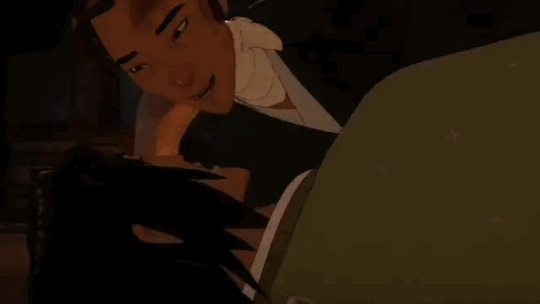

#i am unwell#they are my everything#blue eye samurai#taimizu#mizu x taigen#mizu#taigen#mizu blue eye samurai#taigen blue eye samurai#blue eye samurai memes#blue eye samurai meta#bes mizu#bes taigen#mizu bes#taigen bes#taimizu nation#mizu/taigen#mizu brainrot#taigen x mizu#taigen/mizu#bes memes#bes meta#taizu#migen#bes gifs#bes netflix#tvgifs#animated gif#shipping#ship meme
179 notes
·
View notes
Text
Dear all,
I've been watching Netflix's BLUE EYE SAMURAI and I'm in love! And I know we are going to get a season two and that Mizu's origins will probably be explained much more but I wanted to give you some headcanon already. Here's how I think Mizu came to be. ________________________________________
Mizu's mother knew she was damned from the moment she laid eyes on the handsome foreigner.
Later, when it all went to hell, she'd often wondered why she fell for him so swiftly, so loudly. She cursed herself for not being able to control herself, but deep down, she knew why.
Those blue eyes.
All of her friends and suitors had dark eyes, nearly black. Her people, from lowly farmers to extravagant prostitutes, had eyes like the night. Eyes that could hide so much.
Once, left unattended, she had wandered the halls of her family urban estate, ventured beyond the walls of their dwelling at night. There was a large party going on in the town square, her parents were in attendance. She easily slipped the mind of her supervisor, an old woman that didn't dare tell her parents she was becoming too blind to take care of a six-year old.
From the shadows, a beggar had emerged, eager to take a hostage, already spending the money he'd get from her ransom.
His brown eyes had been filled with darkness.
She still remembered the panic, running away from him. He caught her all the same. What chance did a six year old have against a grown man?
She could fell his bad breath on her face as he squeezed her against his torso uncomfortably.
"I'm going to make a lot of money from you, little girl."
She screamed.
Then she felt blood splattering on her face as a samurai cut down her attacker.
"What were you doing out on your own?" he asked, kneeling down to meet her eyes. His blade was still wet with blood.
"I just wanted to... see the party..." she stammered,
"You can't!" The man sheated his sword. "Danger is everywhere for a girl like you. Do not forget that."
Her parents didn't let her go out much after that. The old lady was fired, the samurai promoted.
She'd never forgotten those dark dark eyes. But she hadn't stopped wandering, either.
Growing up a noble was quite boring. Other children could play; she had lessons in kaligraphy, weaving, economics. She was taught to read and write, how to ride horses. She snuck into the library often, reading the mightiest tales of adventure.
"A lady must know how to sew" a younger copy of the blind woman told her, when she pricked herself with a needle again. Her hair was raven black still, her hands steady.
"You are of an age to be wed now, miss. You need to be careful."
Angry, she'd stormed off to the library.
The samurai, who was now much older, gray showing in his beard, her father's most trusted advisor and most important bureaucrat, had found her there an hour later sitting on the floor reading a book.
"What are you doing in here?"
"Hiding."
"Why?"
"I don't want to marry."
"You will have to. Not long from now, too"
"Spare me the lecture on duty. I'm not in the mood. "
He crouched down, looked somber. "You will have to get better at getting in the mood, then. There are few choices for a lady like you, unfortunately."
She sneered. "So I just do whatever my dad wants. Marry whoever he chooses?"
The old man shook his head. "I'm sorry. Love is not in the cards for you, milady. That's the way it is."
The young girl turned her head, refusing to look him in the eye. "You're no better than the man you saved me from, all those years ago."
The old man sighed, then stood up.
"You know nothing of suffering, milady. You've lived your entire life with food in your stomach, servants to satisfy your every whim. I pray you will learn to appreciate what you have."
"I will appreciate marrying a powerful man for my dad's influence, sure."
"Just promise me one thing."
She looked at him.
"Do not forget danger."
"I promise, wise one."
He rolled his eyes, turned around. Then he walked away. It was the last time she saw him.
And despite his warning, despite her reassurance to heed danger, she'd forgotten to do just that.
During a long boring night of trying to find a suitor, half a week later, Mizu's mother slipped out of the estate, made her way to the town square.
Her supervisor, younger this time, didn't know the estate like she did, found her attention elsewhere and then couldn't find the girl once refocussed.
She went to the town square once again. This time, there was no samurai to save her. He'd been called away, there was conflict somewhere.
She took a cup of strong liquor out of someone's hands, danced. The village was watching in disgust. A lady shouldn't behave like that. The noblemen weren't even near the dancing crowd.
In Japan, modesty was virtue.
But the man she danced with that night wasn't Japanese.
He was loud and brazen and blue-eyed. He knew he wanted her the second he saw her.
"How are you tonight, lady?" he asked her, elegantly adjusting to her rhythm.
He was a foreigner, but she didn't care much about that. His Japanese was heavy, each word pronounced with a heavy drawl. His hands were strong.
"I'm doing well, lord."
"Could I have this dance?" he asked.
Bold. Foreign.
Exiting.
She looked into his eyes. In the dim light, they seemed to shine.
She gave him her hand.
"Yes."
They danced and danced and then she found herself underneath him. He made her see stars. She was never allowed to watch those, back home. He was a powerful man, that she knew from the clothes she tore off his body, but he was kind.
When they were lying on the bed afterwards, her slowly drawing circles on his chest, she asked him what he did for a living.
He smiled. "I trade."
Suddenly, all the alarm bells were ringing. White traders in Japan were normally not smooth-skinned talkers like this. They were criminals, trading drugs and weapons.
And flesh.
"I need to leave" she said, attempting to get out of the bed.
His hands pressed down on her slightly, but commanding. "I don't think you do."
His eyes, warm hours before, were cold now. Not sea, but sheets of ice.
She didn't escape his grasp again. No samurai, no mentor, no one to save her, nor the baby that was developing in her belly.
For 4 years, she was taken around Japan. She was beautiful, yes, and young. She found ways to make herself... "useful". Her parents had stopped looking for her. The old samurai died in his bed, wondering where she was.
She and her child were neglected, but not starved. She lived a life in a cage on the second floors of large castles while her white devil traded lives, drugs and guns. While he terrorized Japan. Her only contact was with a woman of old age.
A woman of her age, she corrected. She wasn't young anymore. Not like she used to be. A kind woman, doing her best to take care of the mother and daughter.
This was not the life she wished on her child. Mizu, she'd named her. Water. After the ocean in her eyes.
One faithful day, she saw her white captor come home with another girl. She knew it wouldn't be long before she'd fall for him too.
Before her and her little baby were no longer kept around for entertainment. She needed to act, and needed to act now.
Before he decided to turn her into one of the trophies she saw hanging on the wall.
She knew of a village, by the sea. Far away from Edo, out of reach for the white bastard. Best fish in the area. She'd been there, once.
She also knew that the front door was locked with a large key only the white devil had access to.
She knew he liked it ugly. She knew where he kept his stash of ryu.
One day, when the woman came to take care of her, she made her case.
"Please help us get out of here" she begged the lady. But she shook her head.
"I can't. He'll kill me, and there is nowhere we can go. "
"Please! Haven't you seen what he does to the other kids once they are old enough to talk?"
The woman nodded. His other bastard children lived in cages, three levels lower, or were sold into slavery once they were old enough. Mizu, a pretty and blue-eyed Japanese girl, would earn the white devil a fortune.
"I'll think about it."
For two weeks, the servant struggled. It was the right thing to do, right?. But it could get her killed. She twisted and turned in her bed. Those blue eyes...
After two weeks she'd made up her mind.
"I can't help you. I'm sorry."
"Please. You have to. He'll kill us."
"I can't take you both!" She screamed. Too scared, too cowardly. Too weak to carry the woman.
"Please, at least take her. Take her and go far from here." Her mother pleaded. "I'll pay you to take care of her. "He keeps his money.."
"I know where he keeps his money!" The lady screamed. "Don't you think I want to get out of here too?"
The mother's voice broke. "Please. I'll do anything. I don't want this life for Mizu."
She took off her necklace. Expensive. Gold.
"Here. Sell this. I'll distract him so you can get to the key. But please, take care of Mizu."
The caretaker looked at the jewelry. It was refined gold, a large gem in the middle. She'd be able to sell that for a lot of money. Live in the countryside with a child, the one thing life had denied her.
"What about you?"
The woman smiled. She lifted the hem of her shirt. A large black spot showed, just below her ribcage. Red streaks were already creeping up her arms.
"He hit me three days ago. Had all his rings on. Broke the skin, and he didn't clean his hands after trading opium."
The older woman looked, in shock. "What... what does.."
"I'll be dead soon. Too weak to make an escape myself. But I'll distract the white devil. Just promise me she will be safe."
The old woman nodded, pocketed the necklace. "I promise."
"His gold is in a locker. 5.000 ryu. You'll need to bribe the guard and get passage away from here."
She nodded, planning her escape. The two women looked at each other. About the same age, one weakened by sepsis, the other terrified of the life ahead of her.
"Thank you"
They nodded to each other.
Three hours later, she sat nearly naked at the dinner table, hands shaking. Mizu was with the other woman, ready to run.
When the white man came in, fresh from the port, he looked suprised. But then he grinned, slid his hands over her exposed shoulders. "What are you doing, darling?."
She shivered. It wasn't cold. "I want to please you, lord."
He lifted her out of her seat, her breast pressing against his chest as she messed with his belt. Her hands were shaking so bad she couldn't get it open.
"You Japanese woman are all the same. Whores for white cock."
The other woman snuck into the bedroom as the white man had his way with her on the table.
She lifted the key off the hinges, hid the baby in her robes, took the gold.
She disappeared like a thief in the night.
"WHERE IS MY GOLD!?" the white man thundered the day after. The sound boomed through the castle, reached the woman in her cell, woke her up.
He stormed in, smacked her in the face. "Where!?"
She smiled at him. She had a high fever, could feel death approaching. She would soon meet her old samurai again. "You'll never find it. "
The white man pulled a knife. His blue eyes were cold as ice. "Where is the kid, then? The blue eyed bastard?"
"She'll never be a slave. And you won't sell her."
She felt the tip of his blade open the skin of her throat. "Tell me!" he commanded.
"You'll never find her, and I won't tell you."
He let her go, roared.
When the blade came down, she was smiling.
65 notes
·
View notes
Text
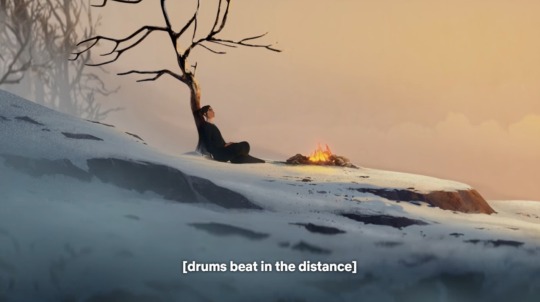
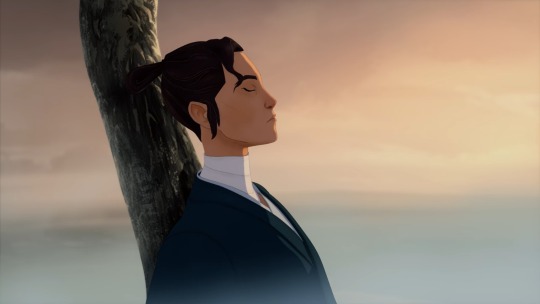
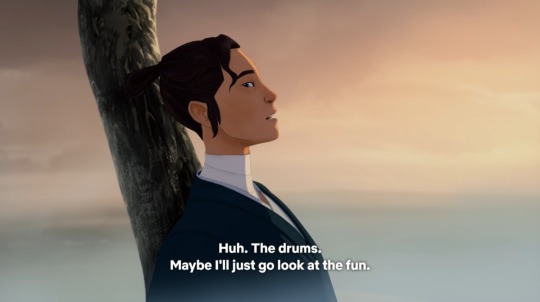
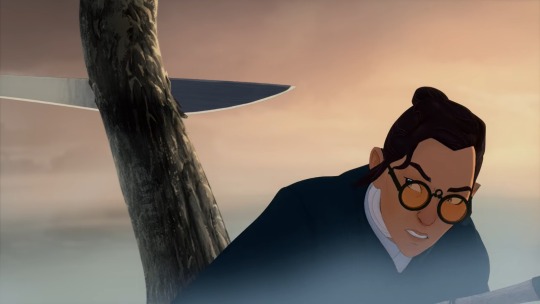
Going to get off the mountain, from a high place, down to "look at the fun", to do something she'd enjoy, to seek out pleasure for once, is what saved her life.

By the end of the season, I interpreted Akemi and Taigen's relationship as over. It appeared to have been doomed when Akemi married to a man she actually liked, but if I had any doupt, it was cemented by them growing incompatible to each other.
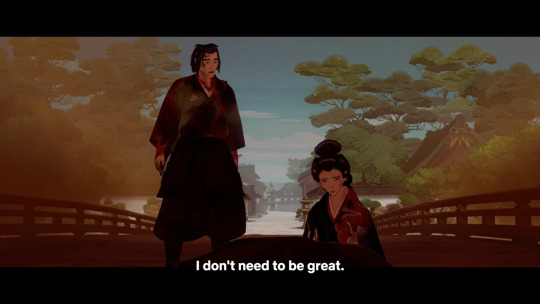


(Notice how Akemi is on one side of the shot, with intense orange fire in the background, while Taigen is on the other side, with the blue sky and the calm forest in the background. Everything from the colors to the atmosphere signifies incompatibility).
Taigen used to value greatness, the show makes references to this all the time.

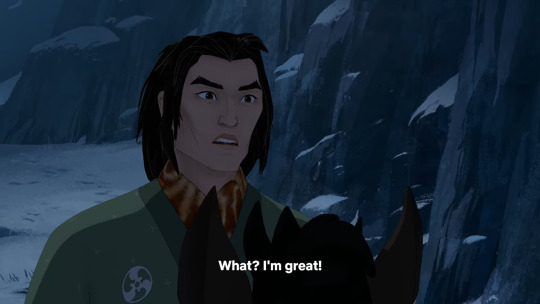
But something changed. Isolating his lines from the previous scene:
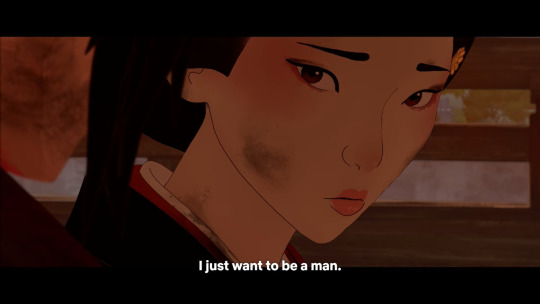



He chose happiness over greatness - the thing he valued, but ultimately had no value if it means he's not happy. Just like Mizu's quest for revenge. It is undoubtedly unhealthy for her and for those around her. She must choose happiness over it, she must dodge the sword.
#reading too much into things again#but i picked up on this on my first watch so am i?#(i am)#mizu meta#mizu#blue eye samurai#blue eye samurai meta#bes#bes meta#ringo#taigen#akemi#akemi blue eye samurai#taigen x mizu#blue eye samurai theory#blue eye samurai predictions#bes theory#after edit: am i unhinged?#maybe#mizu x taigen#taimizu#bes taigen#taizu#bes talk
144 notes
·
View notes
Text
Hello, everyone.
This sideblog is for Netflix’s Blue Eye Samurai meta and rambling.
I might delete it eventually.
I won’t be as graphic in my discussions as the show.
As of December 2, 2023, the origins of this blog, I can see that many people are viciously jealous of their ships and headcanons. To each their own.
This space is for me to find anyone who would like to discuss the same points of the show as me, and even disagree, but kindly.
With that out of the way, read on.
#blue eye samurai#netflix blue eye samurai#bes#metaposting#meta sideblog#blue eye samurai meta#be nice#seriously be nice
1 note
·
View note